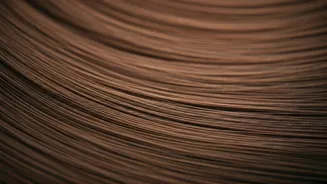Debunking Misconceptions
The world of hair care is filled with beliefs, many of which are more fiction than fact. One of the most prevalent is the idea that moon phases directly
influence hair growth. While this belief has existed for a long time, there is no conclusive scientific evidence to support it. It’s crucial to approach such ideas with a critical eye, understanding that historical beliefs can sometimes persist even when lacking factual backing. For instance, it’s often assumed that cutting hair during a full moon leads to increased growth, but this remains a matter of folklore rather than confirmed science. When deciding on your hair care routine, it is more helpful to rely on research-backed methods, rather than simply sticking to old traditions.
Understanding Hair Growth
Hair growth is a complex biological process influenced by many factors, mostly originating from your genes, which influence everything from the thickness of your hair strands to how rapidly it grows. Also playing a significant role are your overall health, the foods you eat, and the care you give your hair. A healthy diet rich in vitamins and minerals, such as those found in fruits, vegetables, and lean proteins, gives the necessary building blocks for a hair’s optimal growth. Beyond nutrition, regular cleansing, conditioning, and avoiding harsh treatments can help to maintain the health of your hair, supporting its natural growth cycle. Additionally, stress levels and hormone changes can impact hair growth, often contributing to thinning or slowing the growth.
Nutrition's Vital Role
What you eat has a huge impact on your hair's health and growth. Essential nutrients like proteins are particularly important because hair is mainly made of keratin, a type of protein. Insufficient protein intake can lead to weaker hair and decreased growth. Besides protein, vitamins such as biotin, vitamin D, and iron are also crucial. Biotin, found in foods like eggs and nuts, supports the production of keratin, and lack of it can result in hair loss. Vitamin D assists in hair follicle growth, while iron helps transport oxygen to hair follicles, promoting hair growth. Therefore, including a well-rounded diet rich in these nutrients is crucial for hair health, offering the necessary materials for your hair to grow strong and vibrant.
Effective Hair Care Tips
To encourage hair growth, it’s vital to integrate these practical tips into your routine. Gentle washing with mild shampoos is important to prevent damage and remove build-up without stripping your hair of its natural oils. Regularly conditioning is just as important to keep the hair moisturized and less prone to breakage. Avoiding heat styling tools such as blow dryers and curling irons reduces heat damage, which can weaken hair. When using heat, always employ a heat protectant. Furthermore, limiting harsh chemical treatments like perms and coloring your hair less often is better for its health. Gentle handling, using wide-toothed combs, and minimizing friction, particularly when sleeping, are crucial to minimize breakage and ensure healthy, continuous growth.
Scientific Evidence Review
Science backs various methods for promoting hair growth, with some ingredients and treatments showing clear benefits. Minoxidil, a topical medication, has been scientifically proven to stimulate hair growth by expanding the hair follicles, and improving blood flow to the scalp. Finasteride, an oral medication for men, blocks the hormone responsible for hair loss, and is effective for some individuals. In addition, treatments like low-level laser therapy (LLLT) has shown promise in encouraging hair growth by energizing hair follicles. When considering these options, it's crucial to talk with a healthcare professional, who can provide personalized advice based on your specific needs and any underlying conditions, thus ensuring that you choose the most appropriate and safest method.
When to Seek Help
Although many approaches to hair growth are effective, certain conditions require professional intervention. Noticeable hair loss, sudden thinning, or changes in hair texture can indicate a problem that requires expert evaluation. Medical conditions like thyroid disorders, hormonal imbalances, and autoimmune diseases can affect hair growth, and should be diagnosed and addressed by a doctor. Additionally, some medications have hair loss as a side effect. If you experience sudden or significant hair loss, or if your hair health significantly changes, seek a dermatologist or trichologist. They can conduct diagnostic tests to identify the underlying cause and recommend suitable treatment options.




















